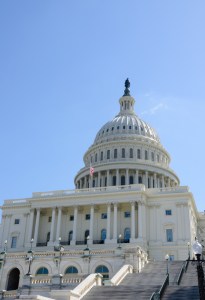Many OHV clubs and associations are 501 (C) (3) not-for-profit organizations as recognized by the Internal Revenue Service (IRS). This designation comes with all sorts of advantages including eligibility for many grant programs, but these advantages come with some limitations particularly when it comes to lobbying. Lobbying is an important component to effective advocacy in support of creating a positive future for OHV recreation, so it is important to know exactly what the IRS allows when it comes to lobbying on behalf of our sport and your club.

Most of the information you need can be found on the IRS website here.
First, it is important to know how the IRS defines lobbying which generally means influencing legislation. From the website above: “An organization will be regarded as attempting to influence legislation if it contacts, or urges the public to contact, members or employees of a legislative body for the purpose of proposing, supporting, or opposing legislation, or if the organization advocates the adoption or rejection of legislation.” A crucial note is this applies to all legislative bodies, not just the U.S. Congress – “Legislation includes action by Congress, any state legislature, any local council, or similar governing body, with respect to acts, bills, resolutions, or similar items (such as legislative confirmation of appointive office), or by the public in referendum, ballot initiative, constitutional amendment, or similar procedure.”
Also important to note is important that a 501 (C) (3) designation does not fully preclude an organization from any and all lobbying. The IRS dictates that “…no organization may qualify for section 501(c)(3) status if a substantial part of its activities is attempting to influence legislation (emphasis added).” This, of course, raises the question – “What does substantial part mean?” Again, from the IRS website: “Whether an organization’s attempts to influence legislation, i.e., lobbying, constitute a substantial part of its overall activities is determined on the basis of all the pertinent facts and circumstances in each case. The IRS considers a variety of factors, including the time devoted (by both compensated and volunteer workers) and the expenditures devoted by the organization to the activity, when determining whether the lobbying activity is substantial.”
The IRS also provides an opportunity for organizations to elect an “…expenditure test under section 501(h) as an alternative method for measuring lobbying activity. Under the expenditure test, the extent of an organization’s lobbying activity will not jeopardize its tax-exempt status, provided its expenditures, related to such activity, do not normally exceed an amount specified…” The expenditure test requires additional paperwork as, “Organizations electing to use the expenditure test must file Form 5768, Election/Revocation of Election by an Eligible IRC Section 501(c)(3) Organization to Make Expenditures to Influence Legislation, at any time during the tax year for which it is to be effective.” Click here for more information about the expenditure test.
Finally, it is critical to know what is NOT considered lobbying as well. “Organizations may, however, involve themselves in issues of public policy without the activity being considered as lobbying. For example, organizations may conduct educational meetings, prepare and distribute educational materials, or otherwise consider public policy issues in an educational manner without jeopardizing their tax-exempt status.”
As ever – be careful of the advice you follow. If anything on the IRS website is unclear to you, or if you are otherwise not sure of how to proceed consult an accounting professional or contact your local IRS office.